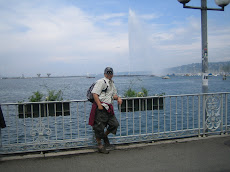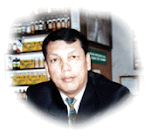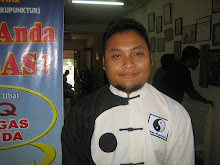Wednesday, December 10, 2008
Acupuncture and Infertility
Acupuncture and InfertilityOn its own, acupuncture can be seen as an alternative way of treating fertility problems. It is also often seen as a complementary therapy to modern fertility treatments. When used alone, though, acupuncture is probably most effective for those couples who are experiencing a functional problem, like irregular ovulation, rather than a structural problem, like a blockage in the sperm ducts. Some practitioners will also recommend Chinese herbs for infertility that will supplement the acupuncture and any other treatment you may be receiving. If you take herbs while receiving other medical treatments, be sure to tell your doctor. Some herbs can interfere with the function of fertility drugs and procedures.
Why acupuncture works for infertility problems is still debatable. However, most practicing acupuncturists say that acupuncture helps by regulating your body’s system. This aids in blood flow to the reproductive organs and stabilizes hormone levels. This in turn will increase ovarian function in women as well as sperm production in men.
Used as a complementary form of therapy for women undergoing other fertility treatments, acupuncture has been proven to be especially beneficial. Some believe that acupuncture works by helping women stay more relaxed through stressful fertility treatments. In particular, studies have shown that acupuncture definitely increases the rate of pregnancy in women undergoing in vitro fertilization (IVF).
A German study done in 2002 showed that of the 80 women who underwent IVF and received acupuncture, 34 women got pregnant, a success rate of 42.5%. Of the 80 women involved in the study who received IVF without any acupuncture treatments, only 21 women (26.3%) became pregnant. More recently, an American study involving 114 women showed that 51% of the women who had acupuncture and IVF treatments became pregnant versus only 36% of the women who had IVF alone.
Deeper analysis of this study revealed that, while 8% of the women in the acupuncture group miscarried, the rate of miscarriage in the IVF-only group was 20%. Furthermore, women who received acupuncture also had lower rates of ectopic pregnancies.
Finding An AcupuncturistMany medical doctors utilize acupuncture in their everyday practice. These doctors need 200 to 300 hours of acupuncture training to be allowed to practice on people. There are many more professionals who specialize just in acupuncture. These individuals have between 2,000 and 3,000 hours of training and have completed board exams to receive their certification. Regardless of which type of professional you prefer, there are some things to keep in mind when deciding on who to see.
Always check that a potential acupuncturist has the appropriate training and certification as mandated by your state or province (the requirements can vary depending on where you live). Ask your friends and family if there is anyone they would recommend. And don’t forget to inquire about the cost of the treatment. Some insurance plans cover acupuncture treatments, so you may want to look into that as well.
Acupuncture is not a one-time procedure, though. You will need to see your acupuncturist once or twice a week for a series of weeks or possibly even months. A series of up to 12 treatments is normal. Each appointment will take about an hour and should include time for an exam and discussion of your current condition, things you can do yourself at home and any questions you may have.
Further Reading http://infertility.xaper.com
In Malaysia we suggest you contact qualified acupuncturist
Mr Prof Dr Nik Omar 019-9401915
Lady Dr Farudah 03-26926549, Nik Badrul 019-9444420
Lady Dr Zaharah 019-9181915
Why acupuncture works for infertility problems is still debatable. However, most practicing acupuncturists say that acupuncture helps by regulating your body’s system. This aids in blood flow to the reproductive organs and stabilizes hormone levels. This in turn will increase ovarian function in women as well as sperm production in men.
Used as a complementary form of therapy for women undergoing other fertility treatments, acupuncture has been proven to be especially beneficial. Some believe that acupuncture works by helping women stay more relaxed through stressful fertility treatments. In particular, studies have shown that acupuncture definitely increases the rate of pregnancy in women undergoing in vitro fertilization (IVF).
A German study done in 2002 showed that of the 80 women who underwent IVF and received acupuncture, 34 women got pregnant, a success rate of 42.5%. Of the 80 women involved in the study who received IVF without any acupuncture treatments, only 21 women (26.3%) became pregnant. More recently, an American study involving 114 women showed that 51% of the women who had acupuncture and IVF treatments became pregnant versus only 36% of the women who had IVF alone.
Deeper analysis of this study revealed that, while 8% of the women in the acupuncture group miscarried, the rate of miscarriage in the IVF-only group was 20%. Furthermore, women who received acupuncture also had lower rates of ectopic pregnancies.
Finding An AcupuncturistMany medical doctors utilize acupuncture in their everyday practice. These doctors need 200 to 300 hours of acupuncture training to be allowed to practice on people. There are many more professionals who specialize just in acupuncture. These individuals have between 2,000 and 3,000 hours of training and have completed board exams to receive their certification. Regardless of which type of professional you prefer, there are some things to keep in mind when deciding on who to see.
Always check that a potential acupuncturist has the appropriate training and certification as mandated by your state or province (the requirements can vary depending on where you live). Ask your friends and family if there is anyone they would recommend. And don’t forget to inquire about the cost of the treatment. Some insurance plans cover acupuncture treatments, so you may want to look into that as well.
Acupuncture is not a one-time procedure, though. You will need to see your acupuncturist once or twice a week for a series of weeks or possibly even months. A series of up to 12 treatments is normal. Each appointment will take about an hour and should include time for an exam and discussion of your current condition, things you can do yourself at home and any questions you may have.
Further Reading http://infertility.xaper.com
In Malaysia we suggest you contact qualified acupuncturist
Mr Prof Dr Nik Omar 019-9401915
Lady Dr Farudah 03-26926549, Nik Badrul 019-9444420
Lady Dr Zaharah 019-9181915
Subscribe to:
Post Comments (Atom)

























No comments:
Post a Comment